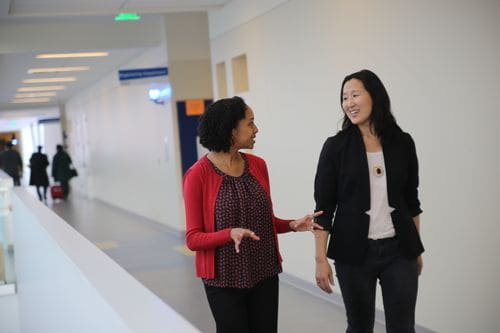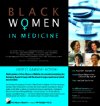Eye For Film >> Movies >> Black Women In Medicine (2016) Film Review
Black Women In Medicine
Reviewed by: Jennie Kermode

Across the US, black women are more likely to be active in the workforce than white women, yet on average they still earn 11 per cent less and they're eight per cent less likely to be in white collar jobs. Say the word 'doctor' and most Americans will still picture a white man. It's predominantly white men you'll see in films and on TV in such roles. This means that Crystal Emery's documentary, structurally simple though it is, is of considerable importance.
Sometimes we don't pay attention to the things that are right in front of us. Black women have been working as doctors in the US for over half a century; here we meet some of the pioneers. Yet we also hear stories from those in their twenties and thirties of walking into operating theatres or conferences and being assumed to be nurses or support staff. Stories of the looks on patients' faces when they explain that they're there to carry out their heart operations. There are few truly egregious stories but this enables the film to make its point more effectively - rather than focusing on a handful of shocking incidents, we see the drip, drip effect of low-level racism, perhaps structural, perhaps unwitting, still significant in its impact on educational opportunities and career progression.

Such prejudice also impacts on the expectations of girls, and that is, perhaps, where this film is most important. Several of Emery's interviewees talk about the passion they felt, very early on, for medicine and the thought of becoming doctors. There are tales of real ambition and determination, perhaps essential to the hard work required in the profession. These are excellent role models for any girl who worries that her sex or the colour of her skin might mean success is out of her reach. There's also a memorable contribution from Karen Morris-Priester, who failed to graduate from high school and had five children before she discovered her ambition yet still succeeded in making it through medical school. These are stories that challenge prevailing narratives about black women's lives. For a thing to be possible, one must first be able to believe that it's possible.
As a disabled woman in the film industry, Emery will herself have faced another set of barriers. This isn't a film that sets out to win over those with no experience of such things. One of her interviewees treats the idea of post-racial America with due derision, and no explanation is offered for the uninitiated. That part of the conversation is old news; the focus here is on what can be done about it. So there's talk of positive discrimination and quotas, talk of black women getting into positions where they can advocate for others, but mostly there is a strong message that those who are told they don't look the part have to believe in themselves.
At first glance the cinematic language of the film seems very plain, but pay attention and you'll notice the focus on gleaming white surfaces and harsh lighting; even the interview rooms are presented like hospital wards. There's a power in simply familiarising us with the presence of black women in these spaces. Emery is undoing the work of all those identikit TV series. It's a reminder of the power inherent in the medium and an indictment of those whose carelessness or laziness has presented a skewed portrait of this aspect of life for so long. Emery's deceptively simple film gets the job done with surgical precision.
Reviewed on: 15 Oct 2016
















